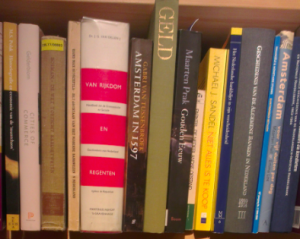 Despite the fact that a lot of documentation is available on all kinds of developments in the Dutch retail payments industry (see this list of references), only few studies are available which actually incorporate all relevant business areas.
Despite the fact that a lot of documentation is available on all kinds of developments in the Dutch retail payments industry (see this list of references), only few studies are available which actually incorporate all relevant business areas.
The best example of such a study is the commemorative book, published by the Postal Giro and Cheque Services in 1968, for the occassion of its 50 years of existence. It describes technical aspects of money transfers, the cost/benefit structure of the organisation, relevant legal issues for both the payment process as well as the investment of consumer deposits. It also provides one of the first examples of automation of previously manual procedures and its impact on the organisational structure and on human resources policy. In sum, the book achieves to provide an integrated view on retail payments in practice, particularly the interrelationship between all business aspects.
One of the starting points of my PhD Rearch into the evolution of the banking and retail payments industry in the Netherlands is that such an integrated view of the retail payment business process is a necessary prerequisite to be able to understand the industry development.
Another starting point is that it is also necessary to take into account the viewpoint and role of all major actors that have shaped the industry throughout the years. These actors include banks, savings institutions, cooperative banks, cashiers, chambers of commerce, parliament, central bank, national and local postal giro services, government departments.
Again it is interesting to note that very few studies are available which do justice to all these different viewpoints. A good study available in this respect is the commemorative book, published on the occassion of the 40th anniversary of the Dutch Banking Association. It provides insight into the strategic behaviour and motivations of different entities in the industry. A number of publications of van der Werff also achieve in taking this strategic perspective, yet these are mostly limited to the viewpoint of groups of similar insitutions.
Evolution and sequences of interactions
The survey of available literature indicates that there might be value in trying to describe the evolution of the non-cash retail payments industry by taking into account all business areas as well as a strategic perspective, which incorporates all relevant actors.
Although it would be convenient to limit such a study to the developments in the second half of the century, the survey also suggests that this would be too short a period. It would then for example not be possible to observe the similarities between certain regulatory and market processes. Furthermore it would be contrary to my third starting point, which is that historical experiences remain present in organisations and or society, to be the implicit or explicit basis for future strategic decisions and opinions.
For example, it is in my opinion only possible to appreciate current debates on cost/benefits for the retail payments industry, if one not only understands the economic background, but remains aware of the fact that the issue has been also fiercely discussed in the early 1920s. And also at that point in time, the positions of banks (payments are unprofitable business) and postal giro (payments are profitable) as well as their organisational and economic set-up was different.
Echoes from the past
Another example is the development of the Amsterdam Municipal Giro in 1916. In my view the long-lasting success of the Amsterdam Exchange Bank, set up in early 17th century, has become part of Amsterdams heritage. This cultural or historical heritage made the step to decide on the establishment of the Municipal Giro only a small one. And there are many more examples like this one -to be demonstrated later- which will hopefully validate my starting point.
I realize that the goal to describe this centuries’ evolution of the retail payments industry from a strategic perspective, while covering all business areas, is pretty ambitious. Certainly if it were to be the goal to demonstrate or validate a specific theory, I’d lable this as a mission impossible. Yet, it is not my intention to dig too deep into the details of the important events which shaped the industry.
I think that a proper description and discussion of these formative events may show a repetitive or continuous character of strategic behaviour of both commercial and regulatory entities involved.
So the primary goal of my ph-d research is to describe as coherently as possible the evolution of retail payments industry in terms of formative events and to to generate hypotheses (using a game-theory/collective action framework) as to the possible motivations of both commercial and regulatory entities which have shaped the industry.